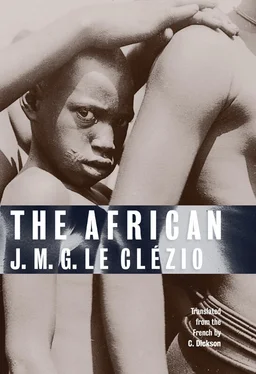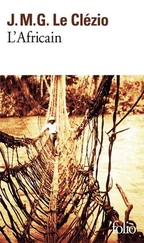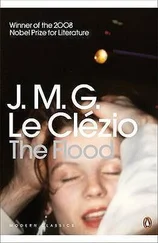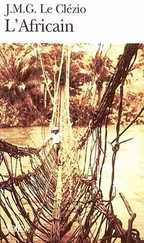There was also the violence. In Banso, in Bamenda, in the Cameroon Mountains, my father was under the charm of the African people’s gentleness and sense of humor.* In Ogoja, everything was different. The country was troubled by tribal warfare, retributions, scores being settled between villages. The roads, the trails were not safe, one could not go out unarmed. The Ibos of Calabar resisted European penetration most vehemently of all. They were said to be Christians (it was even one of the arguments that France used for supporting their struggle against their Yoruba neighbors, who were Muslims). In truth, animism and fetishism were common at the time. Witchcraft was also practiced in Cameroon, but for my father it was more straightforward, more positive. In eastern Nigeria witchcraft was secretive, it was practiced through the use of poisons, hidden amulets, signs intended to bring misfortune. My father heard for the very first time, from the mouths of the European residents and later spread around by the locals in their service, stories of possession, of magic, of ritual crimes. The legend of Aro Chuku and its human sacrifice stone still deeply affected people. The stories that went around created a climate of suspicion, of tension. In such and such a village, they say, not far from Obudu, the inhabitants have a custom of stretching a rope across the road when a lone traveler ventures out on a bicycle. As soon as he falls, the poor man is immediately clubbed over the head, dragged behind a wall and his body cut up to be eaten. In yet another village, the district officer confiscated what was purportedly pork from the butcher shop, but, as rumor has it, was in fact human flesh. In Obudu, where the gorillas from the mountains are poached, their amputated hands can be found on sale in the market as souvenirs, but they say that if you look more closely, you can see there are also children’s hands for sale.
My father repeated those alarming stories to us, he probably only half-believed them. He never saw any evidence of cannibalism himself. But one thing is certain: he often had to travel in order to autopsy murder victims. It was that kind of violence that haunted him. I heard my father say that the bodies he had to examine were sometimes in such a state of decomposition that he needed to tie the scalpel to the end of a piece of wood before cutting into the skin to avoid the explosion of gases.
To him there was something offensive about disease, once the charm of Africa had worn off. The profession he had exercised with enthusiasm gradually grew to be toilsome, in the heat, the humidity of the river, the solitude in that remote corner of the world. The close contact with suffering wore on him: all those bodies burning with fever, the bloated bellies of cancer patients, those legs eaten away with ulcers, deformed by elephantiasis, those faces gnawed away by leprosy or syphilis, those women torn apart in childbirth, those children grown old from deficiencies, their gray skin like parchment, their rust-colored hair, their eyes enlarged at their approaching death. A long time afterward, he talked to me about the terrible things he had to face, as if the same sequence of events would begin all over again every day: an old woman driven mad with uremia who must be tied to her bed, a man from whom he removes a tapeworm so long he has to wrap it around a stick, a young woman he is going to amputate due to gangrene, another one who is brought to him dying of smallpox, her face swollen and covered with pustules. Close physical contact with that land, the feeling one gets only from encountering humanity in all of its painful reality, the odor of skin, of sweat, of blood, the pain, the hope, the small gleam of light that sometimes illuminates a patient’s gaze when the fever goes down, or that infinite second during which a doctor can see life burning out in a dying man’s eye — all of that, everything that had inspired, had stimulated him in the beginning, when he sailed up the rivers in Guiana, when he walked the mountain paths in the Cameroon highlands, was put into question in Ogoja, because of the appalling grind of days filled with unexpressed pessimism, because he realized the impossibility of succeeding at his task.
His voice still husky with emotion, he told me about the young Ibo who was brought to the hospital in Ogoja, hands and feet bound, mouth gagged with a sort of wooden muzzle. He’s been bitten by a dog and rabies has set in. He is lucid, he knows he is going to die. At times in the cell where he’s been isolated, he is seized with attacks, his body arches up on the bed in spite of the ties, his limbs are possessed of such strength that the leather thongs seem to be near breaking. At the same time, he moans and screams in pain, foams at the mouth. Then he falls back into a sort of lethargy, numbed with morphine. A few hours later, my father inserts the needle that will carry the poison into his vein. Before dying the boy looks at my father, he loses consciousness and his chest collapses in one last sigh. What kind of man are you when you’ve lived through that?
* The reputation of the gentleness of the people in the Banso region could hardly be generalized to the rest of west Cameroon. In a study devoted to the Wiya people of the Province of Bamenda, Doctor Jeffries reports atrocities committed during the war that has always pitted them against the Fulanis of Kishong: when the latter capture a Wiya, they slice off his ears and cut off both arms at the elbows and, sewing the palms of his hands together, make a sort of collar that they put around the neck of the prisoner before sending him back to his village. The French and British occupying armies tried in vain to counter such exactions that are reappearing in certain countries in West Africa such as Liberia.
SUCH WAS THE MAN I met in 1948, at the end of his African life. I didn’t recognize him, didn’t understand him. He was too different from everyone I knew, a stranger, and even more than that, almost an enemy. He had nothing in common with the men I had known in France in my grandmother’s circle of acquaintances, those “uncles,” my grandfather’s friends, gentlemen of another age, distinguished, decorated, patriotic, revanchist, talkative, bearing gifts, having families, relations, subscribers to The Travel Journal , readers of Léon Daudet and Barrès. Always impeccably dressed in their gray suits, their vests, wearing stiff collars and ties, sporting their felt hats and wielding their metal-tipped walking sticks. After dinner, they would settle into the leather armchairs — souvenirs of prosperous times — in the dining room, they would smoke and talk, and I would fall asleep with my nose in my empty plate listening to the murmur of their voices.
The man that appeared before me at the foot of the gangway on the wharf at Port Harbor was from another world: wearing a shapeless pair of pants that were too baggy and too short for him, a white shirt, his black leather shoes dusty from the dirt tracks. He was harsh, taciturn. When he spoke French it was with the sing-song accent of Mauritius, or else he spoke in pidgin, that mysterious dialect that jingled like bells. He was inflexible, authoritative, yet at the same time gentle and generous with the Africans that worked for him at the hospital and in his government house. He was full of idiosyncrasies and conventions that were foreign to me, about which I hadn’t the slightest inkling: children should never speak at the table without being authorized, they should not run, or play, or laze in bed. They could not eat between meals, and never eat sweet things. They should eat without laying their hands on the table, could not leave anything in their plates and should be careful never to chew with their mouths open. His obsession with hygiene led him to do amazing things, like washing his hands with alcohol and then lighting a match to them. He was forever verifying the charcoal in the water filter, drank nothing but tea, or even hot water (that the Chinese call white tea), made his own candles out of wax and bits of twine dipped in paraffin, washed the dishes himself with extracts of soapwort. With the exception of his radio connected to an antenna hanging across the garden, he had no contact with the rest of the world, read neither books nor newspapers. The only thing he read was a small black book that I found a long time afterward, and that I can’t open without being moved: The Imitation of Christ , a military-man’s book, as I presume soldiers in the past might have read Meditations by Marcus Aurelius on the battlefield. Of course, he never said anything to us about it.
Читать дальше












